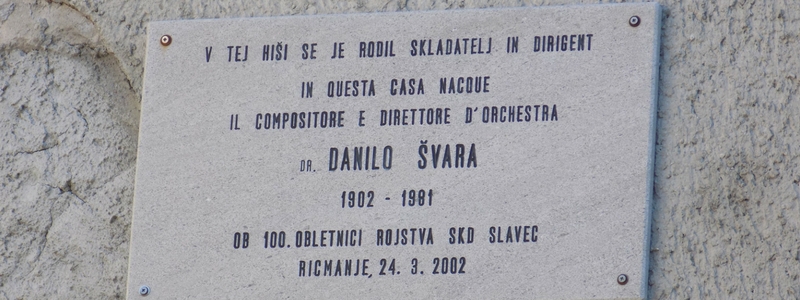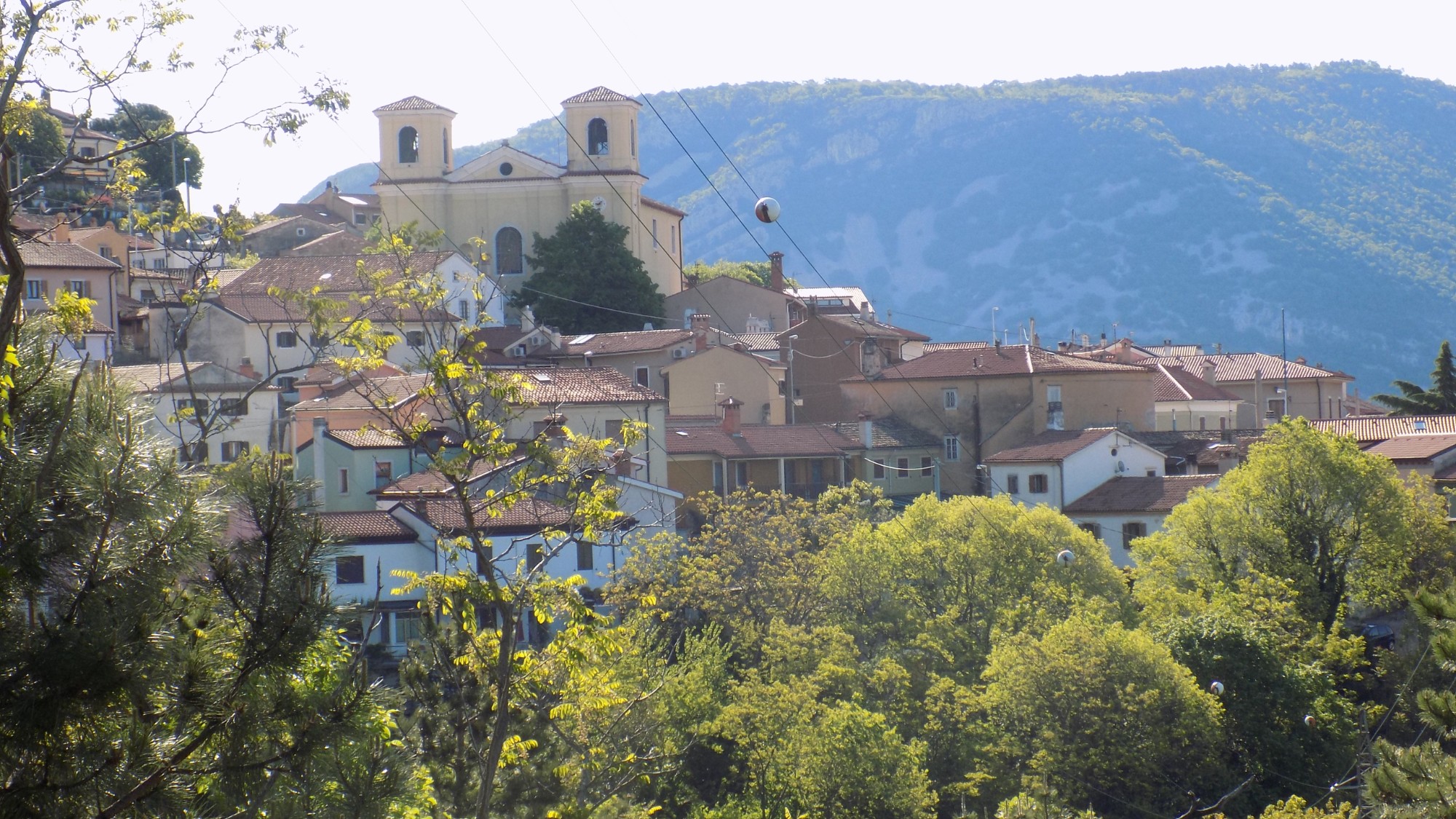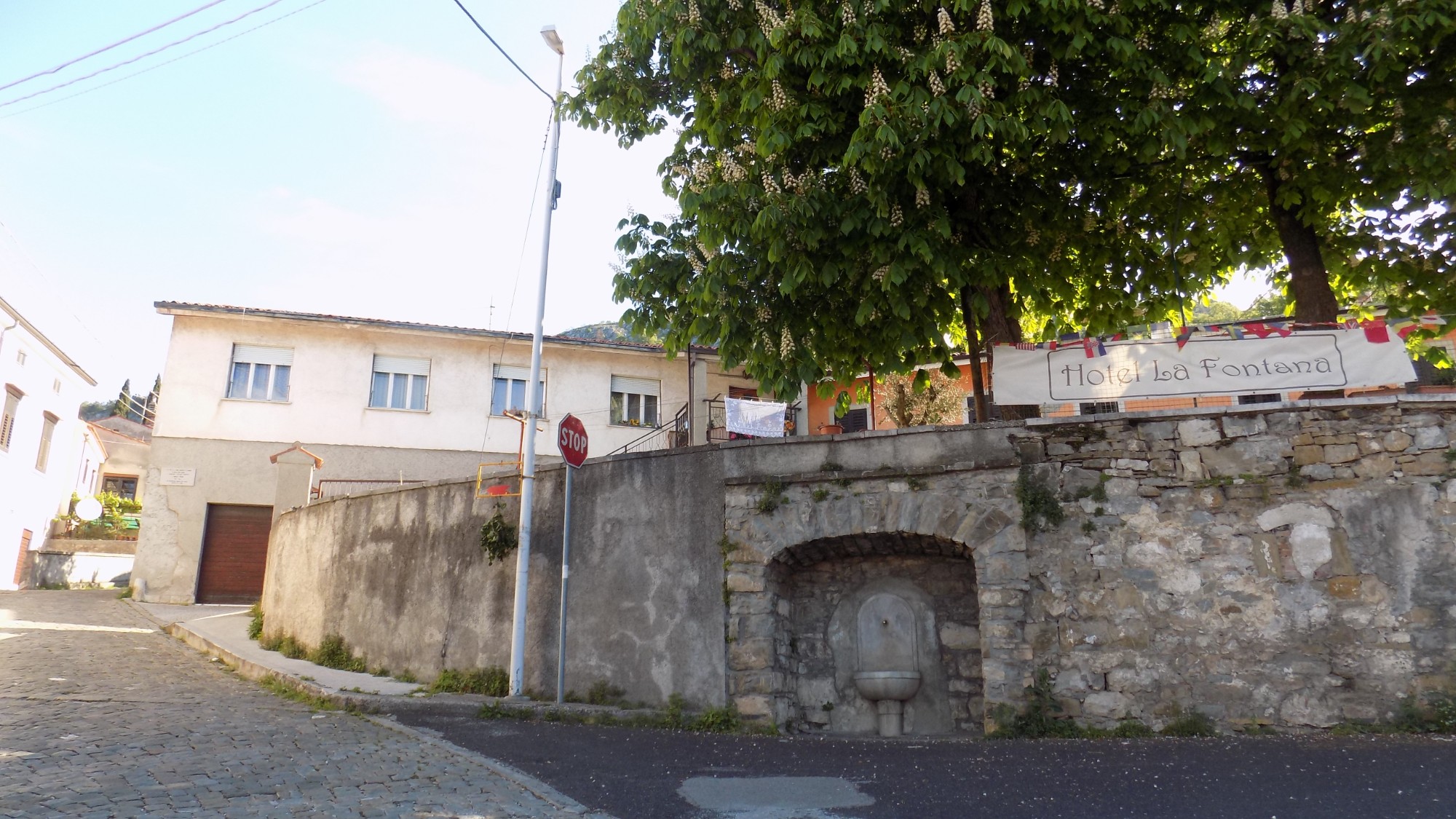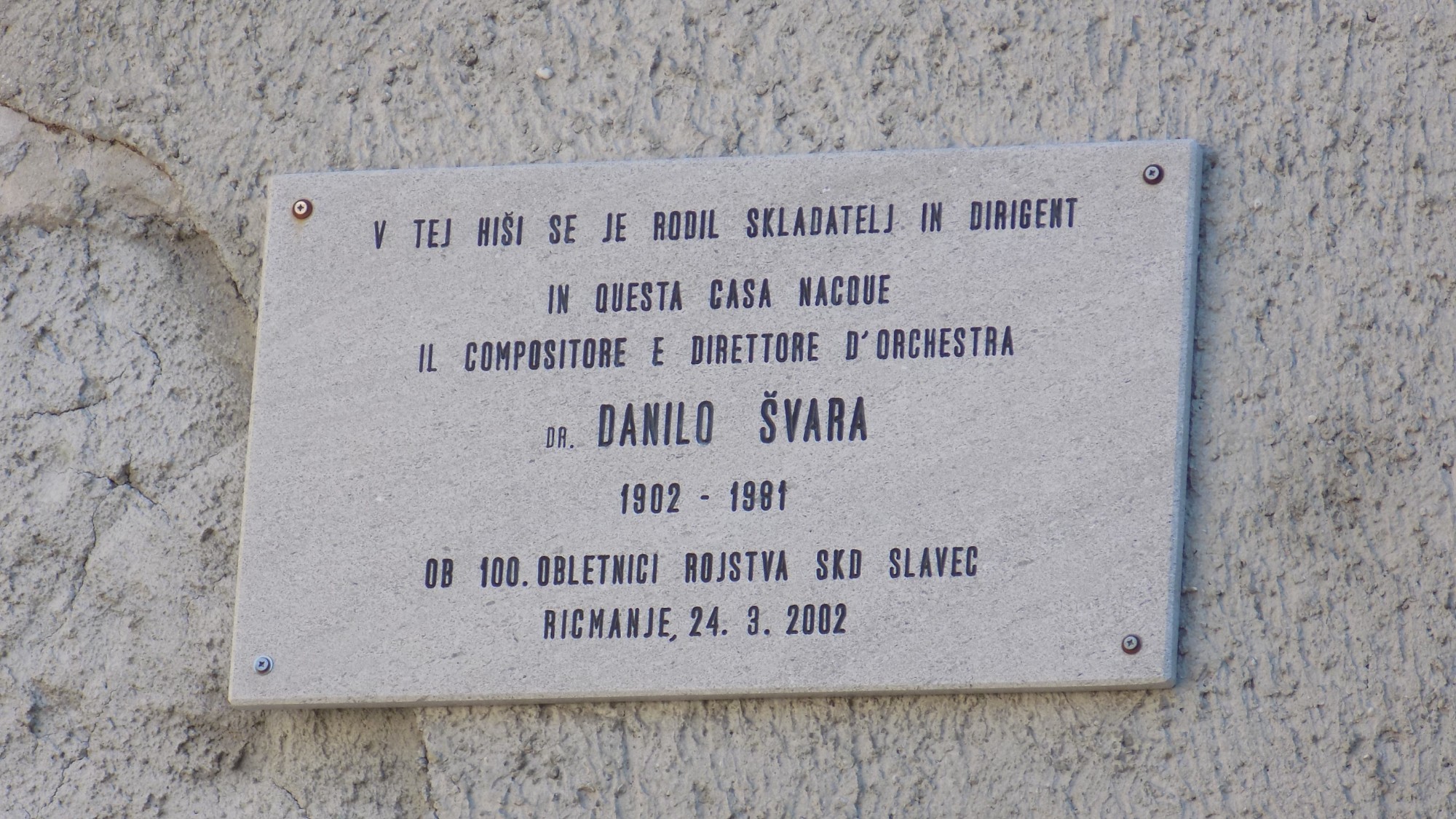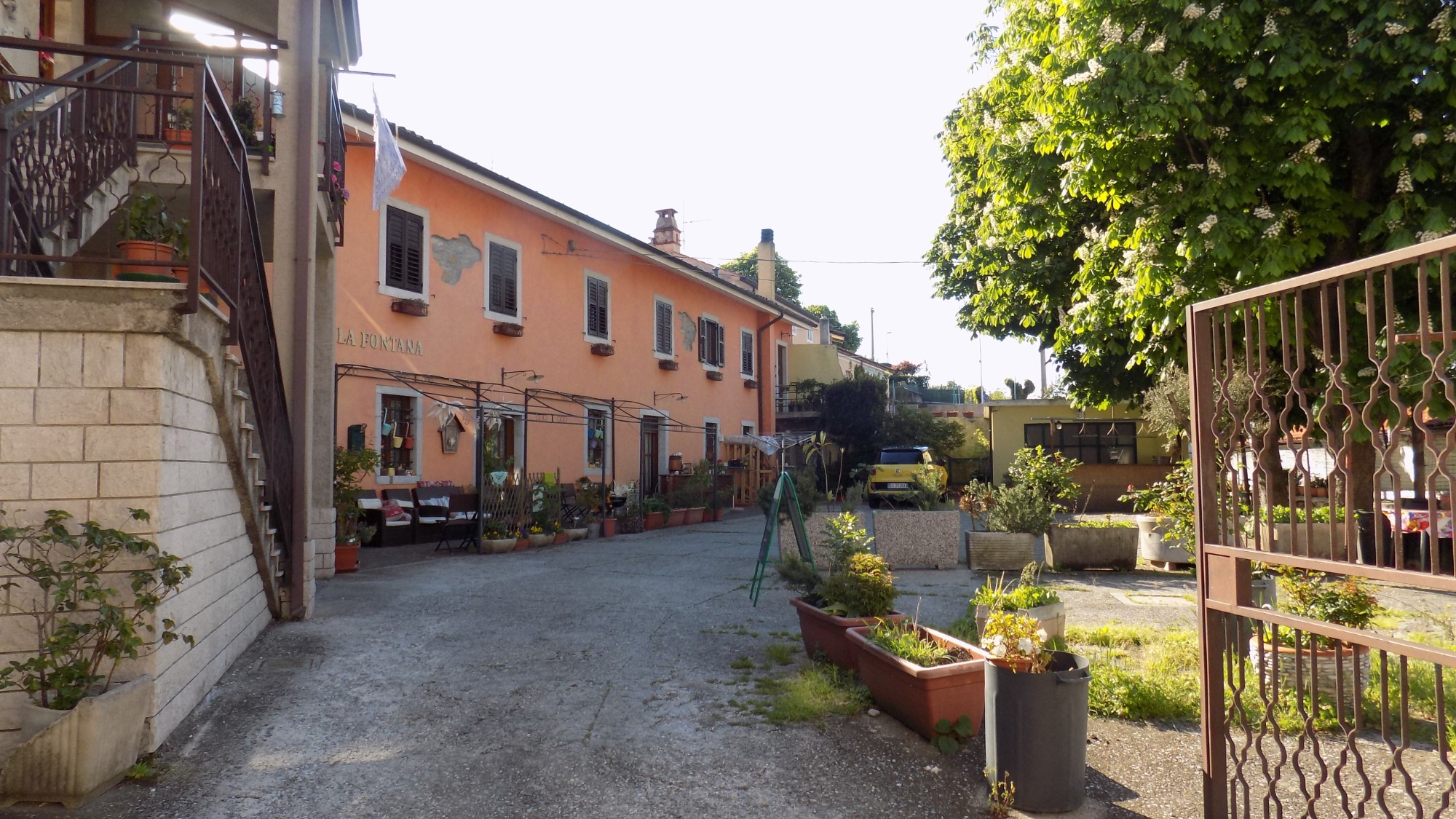In 2002, the cultural society SKD Slavec Ricmanje–Log had a plaque attached to Danilo Švara’s birthplace in commemoration of the centennial of the composer’s birth. The inscription reads: Composer and conductor was born in this house In questa casa nacque il compositore e direttore d’orchestra dr. Danilo Švara 1902–1981. On the 100th anniversary of his birth, SKD Slavec Ricmanje, 24 March 2002.
Danilo Švara
Danilo Švara (1902–1981) achieved prominence as a versatile twentieth-century Slovenian musical figure. He obtained recognition as a distinctive opera and orchestra conductor, pianist, educator and répétiteur, and enriched Slovenian culture with a valuable musical legacy, especially with his opera and symphonic pieces.
Švara was born in San Giuseppe (Ricmanje), near Trieste. He developed an avid interest in music while attending grammar school in Pazin (Istria) under the influence of Professor Saša Šantel. Afterwards, in Vienna, he took private piano lessons from Anton Trost, and regularly went to the Vienna opera house, where he acquired a deep appreciation for the works of Richard Strauss. He occasionally performed as a pianist. Later, in Frankfurt, Švara obtained a doctoral degree in government and political science, and came into contact with atonal music and contemporary trends in music, which made a lasting impression on him. Rather than finding employment as a lawyer or politician, he worked as a répétiteur at the Ljubljana opera house and, after two years, decided to study music with Professor Bernhard Sekles, who tutored Paul Hindemith and Theodor Adorno. At the Frankfurt Conservatory, he studied both composition and conducting with Hermann von Schmeidel and Ludwig Rottenberg.
After graduating, Švara returned to Ljubljana, where he achieved distinction as a versatile musician engaged in composing and performing opera and symphonic music and as an educator. He taught piano at the Glasbena matica Music School and conducting at the Academy of Music. Firmly affiliated with the International Society for Contemporary Music (ISCM), Švara was a highly knowledgeable and influential musical authority. He wrote music reviews for the Delo daily newspaper and, between 1957 and 1959, served as director of the Ljubljana Opera and was president of the Society of Slovenian Composers. In 1973, Švara was presented with the Prešeren Award for his musical oeuvre.
A composer who greatly shared Švara’s worldview and general outlook on music was Slavko Osterc, whose advocacy of progress primarily influenced Švara’s early composing period. One of these earliest works is the cantata Vizije (Visions), a large-scale composition with hints of expressionism. Originally scored in 1931, it was not premiered before 1956, due to its particularly complex choral part. Švara’s innovative composing approach also impressed his former private tutor, Hermann Scherchen, an ardent proponent of contemporary music, who premiered Švara’s Prva simfonija (Symphony No. 1) with the Slovenian Philharmonic Orchestra in 1937. His Simfonija II (Symphony II) and Trio for violin, cello and piano constitute two of his formally more daring, atonal expressionistic compositions.
Švara took a different approach to composing his first opera, Kleopatra (Cleopatra), revising and rewriting the work several times so as to moderate its keen sense of modernity. Although submitting the musical texture to mellifluousness, it still exhibited ample innovativeness and reflected the composer’s maturity. According to some, Kleopatra is the work that provided contemporary Slovenian music theatre with its basic musical outlines. Nevertheless, it is his second work, Veronika Deseniška (Veronika of Desenice), that is considered the crowning achievement of his operatic output. Švara devised it in a concentration camp in 1943, and wrote it down later. He premiered the chamber opera at the Ljubljana Opera in 1946. The piece’s music texture departs from modernity even more markedly, renouncing elements such as dodecaphony and harsher atonal settings, and recalls romantic models in using motifs in the style of Wagner, thus linking extended melodic lines and infusing them with a dramaturgically substantiated expressivity, complemented by a rich and nuanced orchestration.
Švara’s music underwent a major stylistic transformation after World War II, a trend manifest also in the music of many other Slovenian composers. Previously committed to expressionism, his post-war style evolved to show a predilection for late romanticism. Moreover, the composer later sought to imbue his music with a national quality by using folk music materials. In Sinfonia da camera in modo istriano, for example, Švara moulded his re-invented folklorism after that of Bartók.
Working in the operatic genre in the post-war period, Švara modelled his Slovo od mladosti (A Farewell to My Youth) after verismo opera; in thematising the life of poet France Prešeren, he even approached the idea of a national opera. Emerging in the 19th century, national opera fuelled the imagination of European and Slovenian composers well into the 20th century, a time when the concept of nationality in music had changed. National opera entailed far more than merely arousing patriotic sentiments with folk-inflected melodies. It called for a reflection on social and political concerns, complemented by dramatic and literary motifs that symbolise the people.
In the 1960s, Švara revisited his modernist composing postulates and dodecaphony. Works that display the employment of more modern expression include Concerto grosso dodecafono and Fantasia doppia, as well as the orchestral compositions Eseji (Essays) and Juvenalis.
Švara’s stylistic vacillation presumably resulted from the need to adapt his music to the limited performing standards of his milieu, and undoubtedly involved his response to broader social changes. Nevertheless, music scholars deem him a highly original Slovenian modernist.
Maia Juvanc
